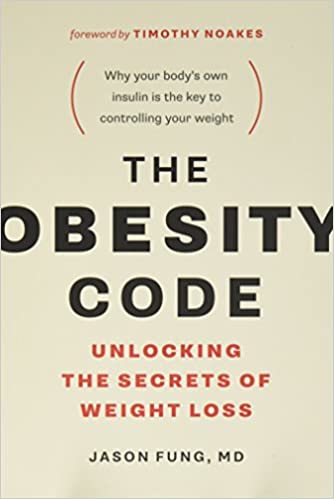The Obesity Code — Book Summary
Introduction
The book explains the factors and elements involved, with the particular reason behind being overweight. We will take an insight into why people cannot lose weight. The book concentrates on finding and identifies the leading causes of the obesity epidemic.
Interesting quotes from the book
Let’s face the truth. Low-calorie diets have been tried again and again and again. They fail every single time.
— Dr. Jason Fung, The Obesity Code
A recent study suggests that 75 per cent of the weight-loss response in obesity is predicted by insulin levels.
— Dr. Jason Fung, The Obesity Code
The last piece of the puzzle there are five basic steps in weight loss: Reduce your consumption of added sugars. Reduced your consumption of refined grains. Moderate your protein intake. Increase your consumption of natural fats. Increase your consumption of fiber and vinegar.
— Dr. Jason Fung, The Obesity Code
Summary of the book The Obesity Code
This book focuses on obesity, and Dr. Fung tells us that being overweight isn't about the eat less and exercise more, but the hormones. The author points out that even a minor modification in our diet can provoke a hormone imbalance which will lead to obesity. Many people resolve to cut the calorie intake for lose weight, but it doesn't work. First, it is necessary to uncover the exact root cause of obesity, then advance towards the solution. If we observe the process of weight gain, we would realize that it is because of hormone imbalance.
Eat less, exercise more mantra
Over the years, overweight people have followed this hymn in the hope they may lose weight. But it has fooled them. The technique doesn't work for most people. It is because of eating wrong food regularly which causes a rise in insulin, and after a certain point, the human body develops insulin resistance which further leads to obesity. Hence now we perceive that imbalance in hormones causes obesity. With a rise in insulin level, you will gain weight no matter how hard you work to lose it.
Body's reaction to less eating
When we are on a low caloric diet, the body doesn't burn extra calories rather the fewer we eat the fewer calories will be burnt.
A reduction in physical activity occurs when we are on a low caloric diet.
The body produces hormones that make us hungry, so we end up eating more.
Effects of stress and lack of sleep (cortisol)
During stress and reduction of sleep, the body releases a hormone called cortisol in large amounts. Cortisol is a source of obesity, so more stress means more weight gains.
The real tough guy (insulin)
Stress and consumption of food plentiful in carbohydrates make the body to form more insulin than required, because of which we develop insulin resistance. This makes insulin the main culprit which causes a gain in weight.
Flaws in our diet
Eating too much sugar is a common mistake we do. Inculcate more fiber foods than carbohydrates. Fibers take longer to digest, and that will help the insulin stay on regulated levels.
We eat too much processed food which promotes obesity. Cutting down such food may help us lose weight.
Restrain from foods that have added sugar in it.
Eat balanced proteins
We know by now that sugar causes insulin secretion. But besides that, during the digestion of proteins and fatty acid incretin hormone is released, and this hormone spikes insulin levels. So, it is important to consume food with the right number of proteins. Otherwise, insulin levels can rise. And an increase or decrease in the incretin levels could cause imbalance.
Consuming fat is crucial
Keep in mind that consuming natural fat is very necessary, otherwise the body will ask for more food. The consumption of fat creates a sense of satiety in the body.
Always consume natural fat and stay away from the fat in treated food.
Solutions for weight loss and healthy eating
By now, we know the many causes of obesity and cutting on calories won't make you lose weight. But if we understand the hormonal role in obesity, we could take the right decision.
Before, we came to know that the primary hormones involved with obesity are insulin, so the correct choice is to lessen insulin.
Steps to break obesity code:
Say no to sugar
Since sugar makes insulin, the smartest decision is to cut down the intake of sugar and products high in sugar. Cut the sugar from the feasting table
Always read the labels
Before purchasing any product read the tags on how much sugar is present. So, you can decide whether you want to consume that much sugar. Beware of the synonyms of sugar, such as glucose, fructose, and corn syrup.
Choose dessert wisely
Everyone loves eating desserts, and these are an integral part of our routine. To eat less sugar, leave desserts such as muffins, cakes, and ice creams. Choose fruit or dark chocolate instead.
Stop snacking
An essential thing to decrease insulin is to stop snacking between the meals, for eating in between is a crucial mistake.
It’s ok to give up breakfast
If you don’t have any special needs, you may skip breakfast and keep a fast till lunch.
Say no to excess sugar drinks
If you cut the drinks with added sugar, you will save yourself from consuming worthless extra sugar. Instead, drink water or you can have tea and coffee without sugar.
Eat whole grains
Reduce the consumption of white flour from your diet. Reduction in white flour will help you lose weight.
Say no to artificial food
Consume carbohydrates in the most natural form. Invest in vegetables rich in vitamins, fiber, and carbohydrate
Consume protein in natural form
Consume the recommended 20%-30% of your protein from meat, vegetables, eggs, and beans.
Increase the natural fat in the diet
Dietary fat makes less insulin as compared to proteins and carbohydrates.
If you are hungry, even after your meal you can consume extra dietary fat,
but from a natural source.
Eat nuts, dairy products, and avocados, which are natural sources of fat.
Avoid extra consumption of oil in food.
Form allies
Eat foods that hinder the insulin level to raise, such as vinegar and
fiber.
Consuming food rich in fiber can help reduce insulin levels.
Start fasting
- Intermittent fasting is one of the best ways to keep the insulin level low.
- While fasting, there is a decline in the insulin level and a rise in metabolism and energy.
- Drink a glass of water on an empty stomach.
- To avoid snacking during the meals, sip water when you are hungry.
- Avoid overeating after fasting.
- When you are not fasting, consume foods that is of good nutritional value.
Review of the book The Obesity Code
Additional to being informational, this book sets the reader towards the right path for shedding weight and understanding the causes of obesity. I enjoyed the book. And so will probably others who wish to stay healthy and fit or who want to lose some weight.
Conclusion
The bottom line is that consuming extra calories is not the cause of obesity. Hormonal imbalance is the cause of most obesity problems. To maintain the hormones balanced, we have to keep a check on our sugar intake and insulin level.
Don't miss the other book summaries on SunInMe.org

